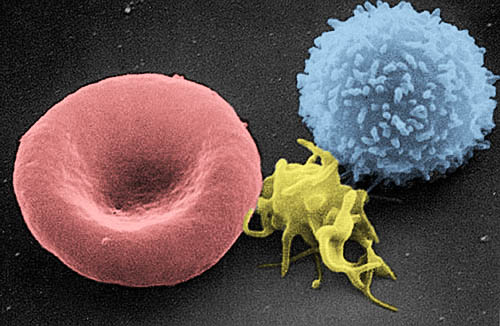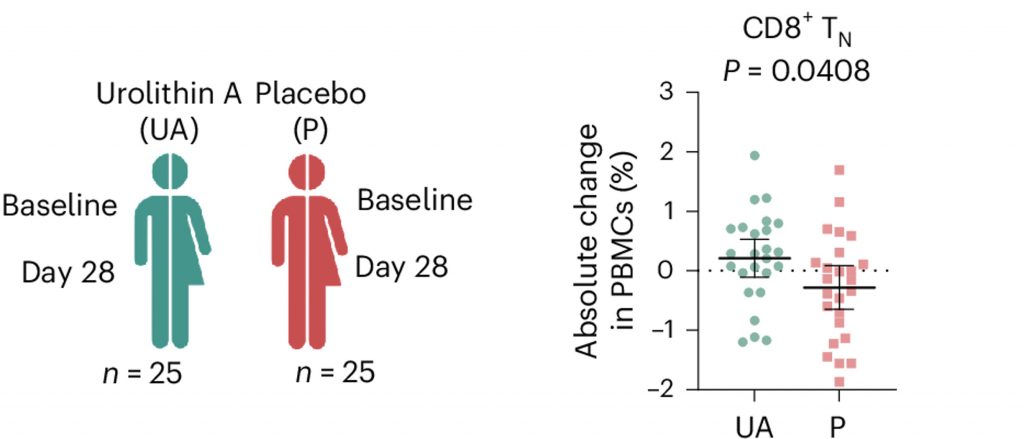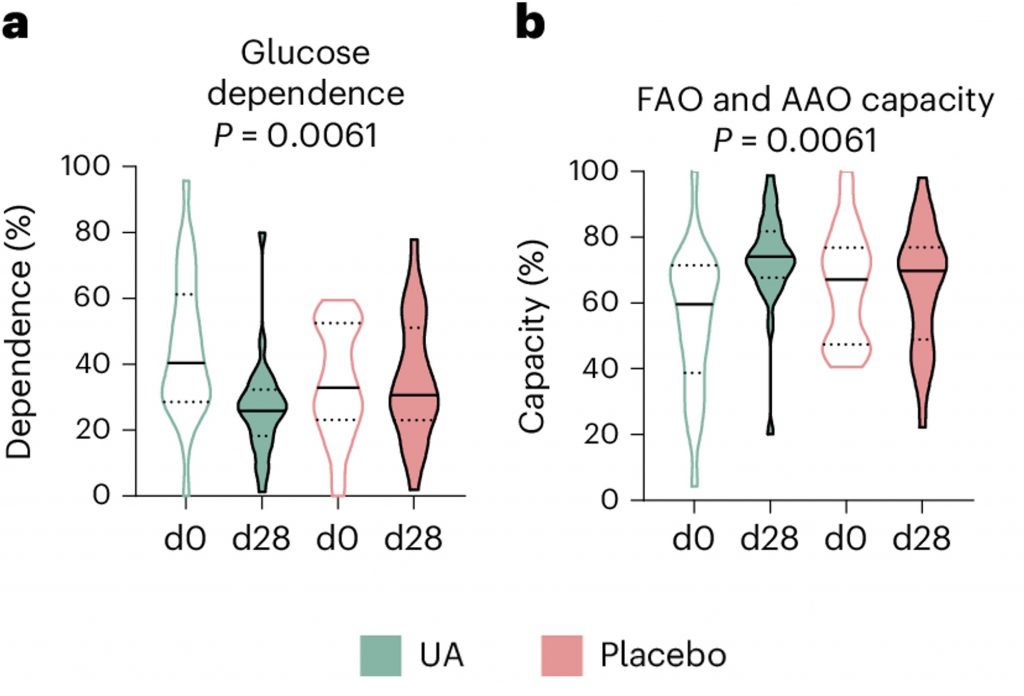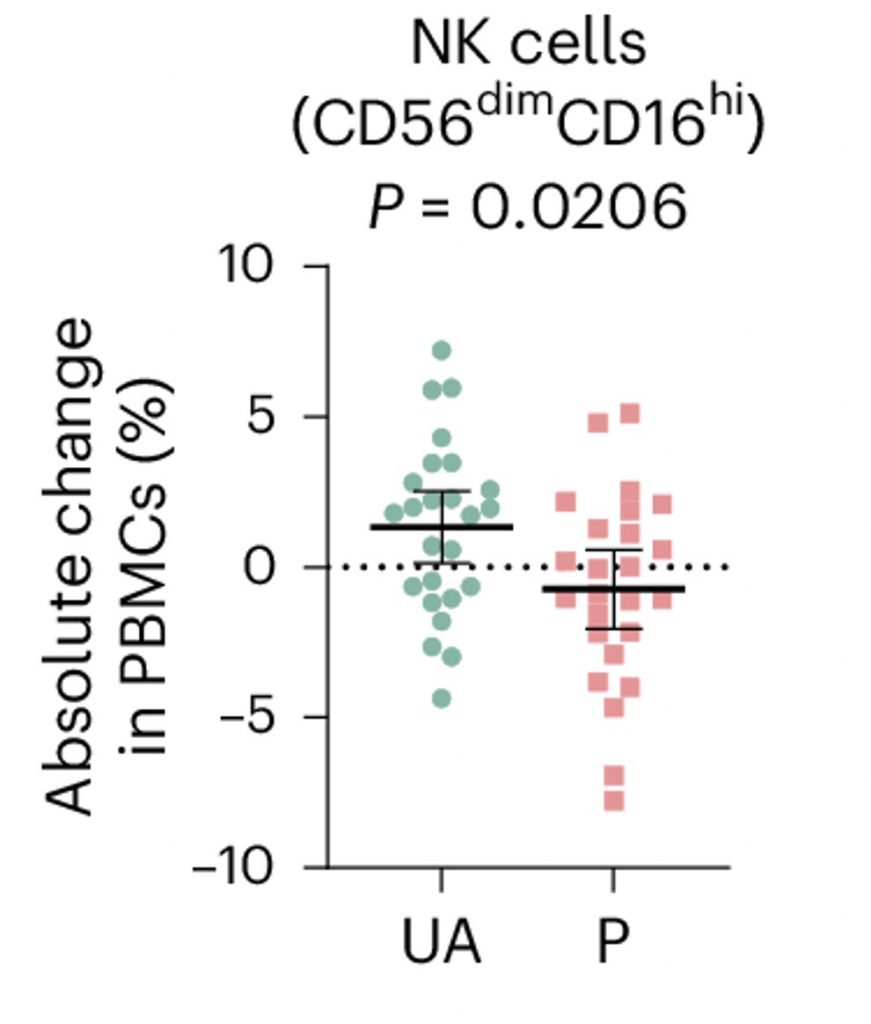Key Points:
- Taking urolithin A (UA) increases white blood cells called naïve T cells in middle-aged adults.
- UA improves the metabolism of these T cells, reducing their dependence on glucose and increasing their capacity to use fats and proteins as fuel.
- Supplementation with UA elevates the levels of white blood cells called natural killer cells.
Our immune system doesn’t just protect us from foreign invaders, but from internal threats, like cancer cells. Crucially, the immune system is responsible for inflammation, a process that, when chronically activated, gradually deteriorates our organs and tissues, leading to neurodegeneration, clogged arteries, and other age-related conditions. Taking this into account, scientists have searched for compounds that can counteract the immune system’s attack on our own body.
In a new study from researchers in Germany, Switzerland, France, and the United States, it was found that the naturally occurring compound urolithin A (UA) mitigates key aspects of age-related immune system decline. Such findings hold implications for treating multiple age-related diseases, including cancer, heart disease, and dementia. The results also support the idea that the consequences of aging can be mitigated or delayed at the cellular level.
The Problem of Immune Aging
Our immune system is remarkably adaptable, forming memories of past infections that can protect us for decades. Yet this very plasticity comes at a cost. As we age, our immune system gradually loses its ability to respond to new threats. The thymus, where T cells mature, shrinks over time. Naïve T cells—fresh immune cells capable of recognizing novel pathogens—dwindle in number, while exhausted memory cells accumulate.

This remodeling culminates in what scientists call “inflammaging”: a state of chronic, low-grade inflammation that increases our vulnerability to infections, reduces vaccine effectiveness, and contributes to diseases ranging from heart disease to cancer. While lifestyle interventions like exercise and caloric restriction can help maintain immune health, nutraceutical approaches have remained largely elusive.
Cellular Housekeeping and Immune Function
The key to understanding the intervention used in the new study lies in the cell’s power plants: mitochondria. These organelles generate the energy our cells need to function, but they also accumulate damage over time. To maintain quality control, cells employ a selective cleanup process called mitophagy—essentially, cellular housekeeping that specifically targets and recycles damaged mitochondria.
When mitophagy falters, dysfunctional mitochondria accumulate, and immune cells suffer. T cells with impaired mitochondrial function secrete inflammatory signals that accelerate aging throughout the body. In cancer, exhausted immune cells infiltrating tumors are characterized by accumulated mitochondrial damage and suppressed energy production. The question researchers have been pursuing is whether improving this cellular cleanup process could restore immune function.

Urolithin A Counters Immune System Aging
This is where UA enters the story. When we eat foods rich in compounds called ellagitannins—pomegranates are an excellent source—our gut bacteria transform them into UA. This molecule has the remarkable ability to trigger mitophagy, jump-starting the cellular cleanup process. Previous studies showed that UA supplementation could improve muscle function in older adults, but its effects on the immune system were unexplored in humans.
In this new trial, researchers recruited 50 healthy adults aged 45 to 70. Half received 1,000 mg/day of UA for four weeks, while the other half received a placebo. The team then conducted an extensive analysis of the participants’ immune cells. The results were striking. Participants taking UA showed a significant expansion of naïve CD8+ T cells—the fresh, versatile immune cells that decline with age. These cells also displayed markers suggesting they were less exhausted and more proliferative.

But the changes extended beyond simple cell counts. The metabolic profile of immune cells underwent a fundamental shift. CD8+ T cells from UA-treated participants showed enhanced capacity to burn fatty acids and amino acids for energy—a hallmark of healthier, more resilient immune cells. Their mitochondria appeared rejuvenated, with increased expression of PGC-1α, the master regulator of mitochondrial biogenesis, suggesting that new, healthy mitochondria were replacing damaged ones.

The benefits weren’t limited to T cells. Natural killer cells—the immune system’s first responders against infected and cancerous cells—expanded in number. Monocytes, another type of immune cell, showed improved ability to engulf bacteria in laboratory tests. When researchers examined gene expression patterns across immune cell types, they found widespread changes in pathways related to inflammation and metabolism, consistent with a more youthful immune profile.

Real-World Implications
Perhaps most importantly, the intervention was remarkably safe. Over the 28-day study period, adverse events were minimal and similar between treatment groups—mostly common colds, with no serious side effects attributed to UA. This aligns with previous studies showing the compound is well-tolerated even over longer periods.
The implications extend beyond simply feeling healthier as we age. A rejuvenated immune system could improve vaccine responses in older adults, enhance resistance to infections, and potentially even support cancer immunotherapy. The researchers noted that many of the changes they observed—increased naïve T cells, improved mitochondrial function, reduced exhaustion markers—are precisely the features associated with successful immune responses to cancer treatment.
Looking Forward
This study represents a proof-of-concept rather than a final answer. The trial was relatively small and short, involving healthy middle-aged adults rather than elderly individuals or those with immune-related conditions. The researchers didn’t assess whether these immune changes translate into tangible health benefits like fewer infections or improved vaccine responses—questions that future studies may address.
Nevertheless, the findings offer something genuinely new: a safe, well-tolerated intervention that can measurably alter the trajectory of immune aging. While we can’t yet claim that UA extends healthspan or prevents age-related diseases, we now have compelling evidence that it can shift the immune system toward a more youthful state at the cellular level.
For those interested in trying UA, it’s worth noting that simply eating pomegranates may not be sufficient. The conversion of ellagitannins to UA depends on gut bacteria, and many people lack the right microbial communities to produce adequate amounts. Direct supplementation, as used in this study, bypasses this limitation.
As our population ages, interventions that maintain immune health become increasingly vital. This study suggests that by helping our cells take out the molecular trash more efficiently, we might be able to keep our immune systems functioning at their best—a prospect that’s both scientifically fascinating and deeply promising for human health.